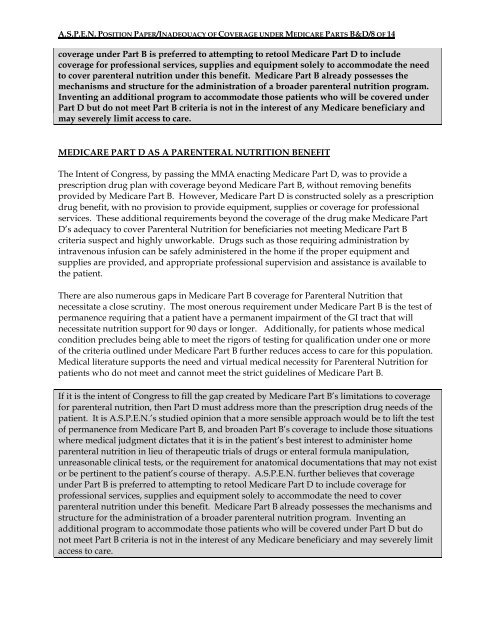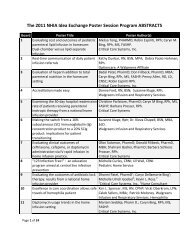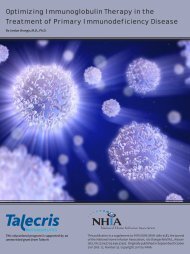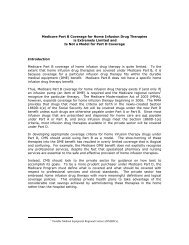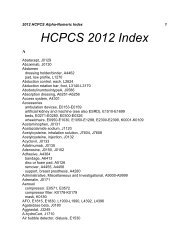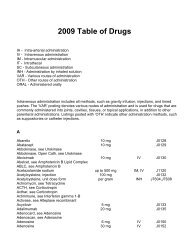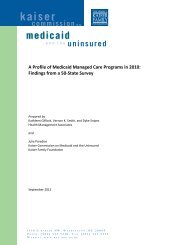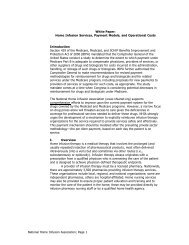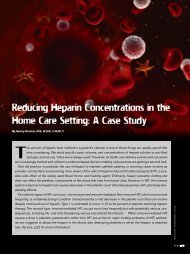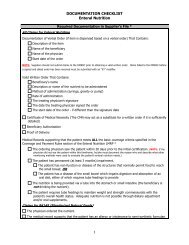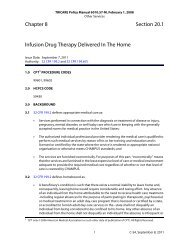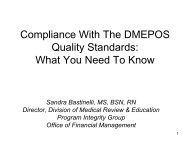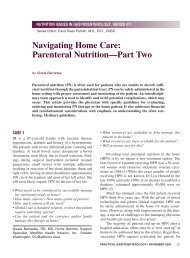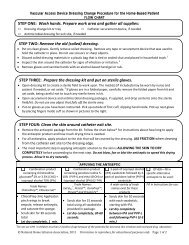Inadequacy of Coverage Under Medicare Part B and - NHIA
Inadequacy of Coverage Under Medicare Part B and - NHIA
Inadequacy of Coverage Under Medicare Part B and - NHIA
Create successful ePaper yourself
Turn your PDF publications into a flip-book with our unique Google optimized e-Paper software.
A.S.P.E.N. POSITION PAPER/INADEQUACY OF COVERAGE UNDER MEDICARE PARTS B&D/8 OF 14<br />
coverage under <strong>Part</strong> B is preferred to attempting to retool <strong>Medicare</strong> <strong>Part</strong> D to include<br />
coverage for pr<strong>of</strong>essional services, supplies <strong>and</strong> equipment solely to accommodate the need<br />
to cover parenteral nutrition under this benefit. <strong>Medicare</strong> <strong>Part</strong> B already possesses the<br />
mechanisms <strong>and</strong> structure for the administration <strong>of</strong> a broader parenteral nutrition program.<br />
Inventing an additional program to accommodate those patients who will be covered under<br />
<strong>Part</strong> D but do not meet <strong>Part</strong> B criteria is not in the interest <strong>of</strong> any <strong>Medicare</strong> beneficiary <strong>and</strong><br />
may severely limit access to care.<br />
MEDICARE PART D AS A PARENTERAL NUTRITION BENEFIT<br />
The Intent <strong>of</strong> Congress, by passing the MMA enacting <strong>Medicare</strong> <strong>Part</strong> D, was to provide a<br />
prescription drug plan with coverage beyond <strong>Medicare</strong> <strong>Part</strong> B, without removing benefits<br />
provided by <strong>Medicare</strong> <strong>Part</strong> B. However, <strong>Medicare</strong> <strong>Part</strong> D is constructed solely as a prescription<br />
drug benefit, with no provision to provide equipment, supplies or coverage for pr<strong>of</strong>essional<br />
services. These additional requirements beyond the coverage <strong>of</strong> the drug make <strong>Medicare</strong> <strong>Part</strong><br />
D’s adequacy to cover Parenteral Nutrition for beneficiaries not meeting <strong>Medicare</strong> <strong>Part</strong> B<br />
criteria suspect <strong>and</strong> highly unworkable. Drugs such as those requiring administration by<br />
intravenous infusion can be safely administered in the home if the proper equipment <strong>and</strong><br />
supplies are provided, <strong>and</strong> appropriate pr<strong>of</strong>essional supervision <strong>and</strong> assistance is available to<br />
the patient.<br />
There are also numerous gaps in <strong>Medicare</strong> <strong>Part</strong> B coverage for Parenteral Nutrition that<br />
necessitate a close scrutiny. The most onerous requirement under <strong>Medicare</strong> <strong>Part</strong> B is the test <strong>of</strong><br />
permanence requiring that a patient have a permanent impairment <strong>of</strong> the GI tract that will<br />
necessitate nutrition support for 90 days or longer. Additionally, for patients whose medical<br />
condition precludes being able to meet the rigors <strong>of</strong> testing for qualification under one or more<br />
<strong>of</strong> the criteria outlined under <strong>Medicare</strong> <strong>Part</strong> B further reduces access to care for this population.<br />
Medical literature supports the need <strong>and</strong> virtual medical necessity for Parenteral Nutrition for<br />
patients who do not meet <strong>and</strong> cannot meet the strict guidelines <strong>of</strong> <strong>Medicare</strong> <strong>Part</strong> B.<br />
If it is the intent <strong>of</strong> Congress to fill the gap created by <strong>Medicare</strong> <strong>Part</strong> B’s limitations to coverage<br />
for parenteral nutrition, then <strong>Part</strong> D must address more than the prescription drug needs <strong>of</strong> the<br />
patient. It is A.S.P.E.N.’s studied opinion that a more sensible approach would be to lift the test<br />
<strong>of</strong> permanence from <strong>Medicare</strong> <strong>Part</strong> B, <strong>and</strong> broaden <strong>Part</strong> B’s coverage to include those situations<br />
where medical judgment dictates that it is in the patient’s best interest to administer home<br />
parenteral nutrition in lieu <strong>of</strong> therapeutic trials <strong>of</strong> drugs or enteral formula manipulation,<br />
unreasonable clinical tests, or the requirement for anatomical documentations that may not exist<br />
or be pertinent to the patient’s course <strong>of</strong> therapy. A.S.P.E.N. further believes that coverage<br />
under <strong>Part</strong> B is preferred to attempting to retool <strong>Medicare</strong> <strong>Part</strong> D to include coverage for<br />
pr<strong>of</strong>essional services, supplies <strong>and</strong> equipment solely to accommodate the need to cover<br />
parenteral nutrition under this benefit. <strong>Medicare</strong> <strong>Part</strong> B already possesses the mechanisms <strong>and</strong><br />
structure for the administration <strong>of</strong> a broader parenteral nutrition program. Inventing an<br />
additional program to accommodate those patients who will be covered under <strong>Part</strong> D but do<br />
not meet <strong>Part</strong> B criteria is not in the interest <strong>of</strong> any <strong>Medicare</strong> beneficiary <strong>and</strong> may severely limit<br />
access to care.


